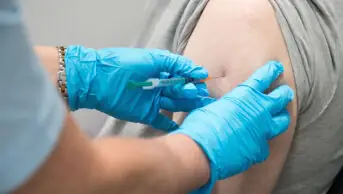
Mclean/Shutterstock.com
For most of us, learning to live with COVID-19 means getting on with our lives. However, for many of the 1.8 million people in the UK living with long COVID, returning to ‘normal’ is not an option.
Of those who report persistent symptoms for at least four weeks after initial COVID-19 infection, 1.2 million people say they adversely affect day-to-day activities. In the most severe cases, crippling fatigue as well as cognitive, respiratory and cardiac problems leave long haulers having to work reduced hours or unable to return to work at all.
This is without taking into account the psychological impact for people, who often have gone from being healthy to suddenly having a long-term condition with wide-ranging symptoms.
Office for National Statistics data show that long COVID disproportionately affects those of working age — specifically those aged 35–49 years — and prevalence is highest among health and social care workers, and teachers, many of whom will have acquired COVID-19 through exposure at work.
With life on hold for such large swathes of the population, what is the government doing to find effective treatments for this chronic condition and to help those affected return to their pre-COVID lives?
However, for many long COVID patients, the answer to this is not enough.
Data show that 36% of patients with symptoms of long COVID assessed by a specialist had waited more than 15 weeks to be seen
The NHS has established a network of more than 80 long COVID clinics in England, but the most recent monthly data show that 36% of patients assessed by a specialist had waited more than 15 weeks to be seen. Participants at a Westminster Health Forum seminar on long COVID, held in March 2022, complained that, when they are finally able to access clinics, the focus is on rehabilitation and managing symptoms, whereas they would like their active illness to be treated.
The All-Party Parliamentary Group on Coronavirus (APPG) recently accused the government of inadequately funding these long COVID clinics, which it said do not meet current demand and are not being used to conduct patient-guided research.
The APPG found that this failure to provide adequate care has driven people with long COVID to turn to private healthcare providers, often overseas, with some spending tens of thousands of pounds in the search for answers.
When it comes to research, the UK government has invested £50m into studies on how to help patients with long COVID from the National Institute for Health Research (NIHR).
One such study — STMULATE-ICP (Symptoms, Trajectory, Inequalities and Management: Understanding Long-COVID to Address and Transform Existing Integrated Care Pathways) — includes a platform trial arm, which will compare the effectiveness of antihistamines loratadine and famotidine, the anti-clotting drug rivaroxaban and anti-inflammatory colchicine in non-hospitalised patients with long COVID. However, recruitment — which was due to start in December 2021 — has been delayed until late May 2022 and, initially, it will only be open to patients with new long COVID who have been referred to NHS long COVID clinic services in six areas across England and have not yet seen a specialist.
The APPG recommends that the £50m pledged for long COVID research is doubled to £100m and matched each year to support the development of new treatments for long COVID. There is an argument that the NHS needs to take a more urgent, imaginative approach.
For instance, it took just nine days from conception to launch the RECOVERY trial, which recruited some 47,000 participants across 200 sites in six countries and managed to identify four life-saving therapies for patients hospitalised with acute COVID-19. There are no trials under way to tackle potential pathologies of long COVID, such as viral persistence and autoimmunity, despite emerging evidence that RNA fragments of SARS-CoV-2 can remain in the gut of long COVID patients up to seven months after initial infection and recent anecdotal reports that Paxlovid (nirmatrelvir + ritonavir; Pfizer) may ease symptoms.
While rehabilitation is important, patients are desperate for more research into treatment approaches that can help repair some of the damage from COVID-19 that they must currently live with. It is imperative that long COVID starts to be treated as a biological disease, and that drugs that target the underlying mechanisms are trialled with the same urgency as therapeutics were for acute COVID-19.
Otherwise, while most people can move on with their lives, those with long COVID will be left behind. PJ
1 comment
You must be logged in to post a comment.



Thank you for continuing to highlight the effects of LongCOVID.